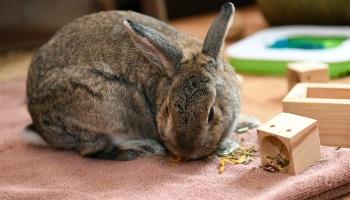Fresh, clean water, 24/7
Ensure your rabbits have constant access to fresh, clean water.
- Provide water the way they're used to - e.g. in a heavy ceramic bowl or a drip-feed bottle. Rabbits prefer water bowls
- Ensure water is algae-free in summer
- Make sure it doesn't freeze in winter
- Check bottles - if using bottles, check them each day to make sure your rabbits can access the water and the end isn't blocked
Hay and grass daily
Rabbits need at least one bundle of good quality hay everyday, and it should be as big as they are!
- Make sure they always have hay - good quality, fresh hay should be available at all times
- Let them graze - ideally, rabbits should have access to growing grass for grazing, or kiln-dried grass
- Don't feed lawnmower clippings, as these can make your rabbits ill
Leaf greens daily
Rabbits must have an adult-sized handful of safe, washed leafy green vegetables, herbs and weeds daily.
- Feed a variety of greens daily - ideally 5-6 different types, such as cabbage, kale, broccoli, parsley and mint
- Introduce new types of greens gradually, in small amounts, to avoid potential stomach upsets
Find out more in rabbit-safe plants, vegetables, herbs and fruits. Your vet can also advise about rabbit-safe plants. If in doubt, leave it out!
Pellets
Feed your rabbits a small amount of good quality pellets or nuggets daily.
- Give them the right amount - measure 25g (an eggcup-full) of pellets per kg of your rabbit's body weight. For example, for a medium-sized rabbit (2kg), feed a maximum of two full egg cups.
- Muesli-style foods aren't recommended for rabbits - see why muesli is unhealthy for rabbits and learn how to slowly transfer your rabbits onto a healthier diet.
Healthy treats
You can use part of their daily ration of greens, pellets or nuggets as treats and rewards during training. Carrots and apples are fine as occasional treats in small amounts, but don't feed any other treats, as these may harm your rabbit. Find out more about making feeding time fun for your rabbits.
Top tips
- Know their weight: adjust your rabbits' food to ensure they're not overweight or underweight.
- Different rabbits, different needs: young, pregnant, nursing or ill rabbits have different needs. Ask your vet for advice on suitable diets.
- Talk to your vet if you're unsure about providing the best diet for your rabbits.

